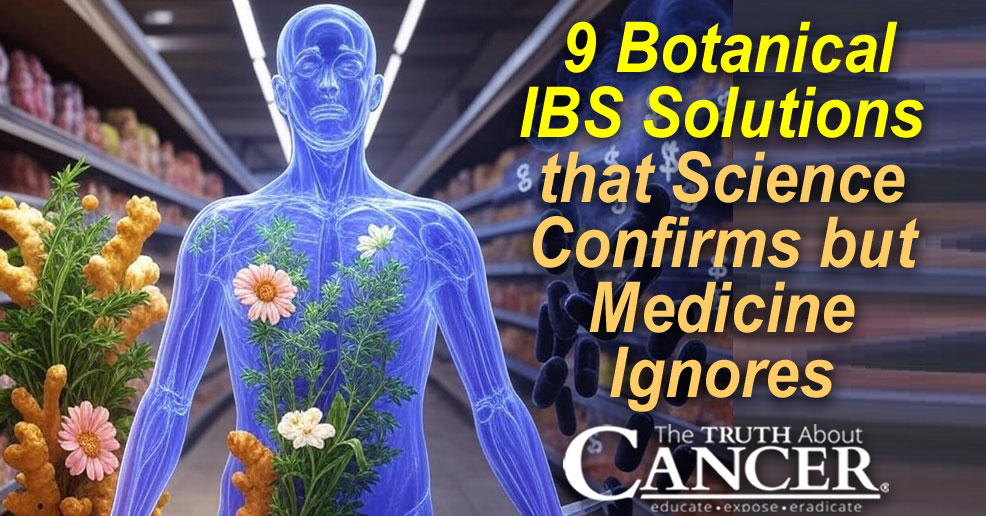Irritable Bowel Syndrome (IBS) is a global health crisis, affecting an estimated 10-15% of the world’s population, with 25-45 million sufferers in the U.S. alone, according to the International Foundation for Gastrointestinal Disorders. Despite its prevalence, conventional medicine offers little more than temporary symptom management—antispasmodics, laxatives, and low-dose antidepressants—while ignoring the root causes. Why? Because a cured patient is a lost customer.
What if IBS isn’t just an “incurable disorder” but a direct consequence of modern food toxins, gut microbiome destruction, and systemic inflammation—all while Big Pharma and the processed food industry keep you dependent on their products? The truth is being suppressed, but emerging research reveals that natural, holistic approaches can restore gut health without dangerous drugs.
The medical-industrial complex thrives on chronic illness, not cures. Doctors are trained to prescribe symptom suppressors like Linzess or Amitriptyline, but they rarely address leaky gut, bacterial overgrowth (SIBO), or food sensitivities. Meanwhile, the processed food industry floods our diets with gut-destroying additives—GMOs, glyphosate, emulsifiers (like carrageenan), and artificial sweeteners—all of which disrupt the microbiome. Studies show that ultra-processed foods directly cause intestinal inflammation, yet these products remain staples in supermarkets.
Even more alarming, antibiotics and prescription medications—handed out freely by doctors—wreak havoc on gut bacteria, leading to long-term dysbiosis (an imbalance in gut flora). Research confirms that probiotics, fermented foods, and herbal therapies can restore gut health (Natural News, 2013), yet this information is rarely discussed in mainstream medicine. Why? Because there’s no profit in natural healing.
For centuries, herbal healers understood what modern medicine now confirms through clinical research: certain plants hold extraordinary power to heal IBS at its root. These aren’t just folk remedies – they’re science-backed solutions with results that often outperform pharmaceuticals. Yet most gastroenterologists remain strangely silent about them.
Here are nine botanicals that may help alleviate IBS symptoms.
- Ginger: The Digestive Superhero
Science reveals that ginger works in three ways to alleviate IBS symptoms: reducing nausea by 75%, acting as a natural antispasmodic, and decreasing gut inflammation. Its secret weapon? Compounds that hijack serotonin receptors in your gut to calm digestive storms.
- Slippery Elm: The Gut’s Bouncer
This miracle worker forms an instant protective shield along your intestinal walls. Clinical trials show that it reduces inflammation while performing the ultimate balancing act: bulking loose stools and softening hard ones simultaneously.
- Marshmallow Root: The Velvet Glove
Imagine coating your raw, irritated gut in liquid armor. Marshmallow root’s mucilage creates a biofilm that helps reduce gut permeability— a game-changer for individuals with leaky gut syndrome.
- Licorice Root: The Intestinal Handyman
While drugs merely mask symptoms, licorice root actively repairs damaged gut lining. It boosts protective mucus production while outperforming antacids for GERD – yet you’ll never hear this from your GI specialist.
- Chamomile: The Nervous Gut Whisperer
This humble flower delivers a one-two punch, reducing painful gut spasms while calming the gut-brain axis hyperactivity that drives IBS symptoms. It’s nature’s Xanax for your digestive tract.
- Fennel: The Bloat Assassin
Clinical evidence shows that fennel effectively eliminates bloating and reduces abdominal pain. Its secret? Compounds that rewire gut motility more effectively than prescription drugs.
- Peppermint Oil: The Heavy Artillery
The research is overwhelming: peppermint oil outperforms antispasmodic drugs for IBS relief. Yet it remains suspiciously absent from most IBS treatment plans.
- Turmeric: The Inflammation Terminator
Curcumin not only reduces IBS symptoms but also repairs gut barrier function while lowering inflammatory markers. Big Pharma can’t patent it, so they pretend it doesn’t work.
- Artichoke Leaf: The Bowel Conductor
This underrated remedy helps reduce IBS symptoms and normalize bowel movements while promoting beneficial gut bacteria. It’s the closest thing to a “reset button” for your digestive system.
The ugly truth is this: these natural remedies remain suppressed not because they lack evidence, but because they can’t be patented, they actually heal rather than merely manage symptoms, and they pose a real threat to the $8 billion IBS drug industry. It’s not about efficacy—it’s about control, profits, and preserving the pharmaceutical status quo.
The science is clear. These botanicals work. So, the real question is: How much longer will you let a broken system profit from your pain? Your gut was designed to heal. It just needs the proper support.
While botanicals play a powerful role in healing IBS, no gut health protocol is complete without addressing the microbiome—the complex community of trillions of bacteria that live in your digestive tract. These beneficial microbes are the unsung heroes of digestion, immune regulation, and inflammation control. But thanks to antibiotics, processed foods, and environmental toxins, our gut flora is often wrecked. That’s where probiotics come in. High-quality probiotic supplements can help replenish and rebalance your gut bacteria, improving digestion, reducing IBS symptoms, and even boosting mood. We’ve tested dozens over the years, and our top pick is Probiotic Breakthrough—a potent, science-backed formula that delivers results you can feel.



















Ty and Charlene, I just can’t thank you both enough and all those involved in your benevolent crusade to help mankind. You both truly are working for our Loving God. The information you share is so profound and I can tell you do your work from the heart. May God continue to bless you. Lot’s of LOVE to all
Thank you for this information. I suspect there are many more people who suffer from IBS than you reported. I’ve seen at least five GI doctors and NONE have been able to help me.
No WONDER my Celestial Seasonings Tension Tamer tea works so well for IBS issues! It’s my go-to remedy when the IBS acts up. I also used it as a highly effective remedy for nausea during chemo (which I did know could be worse than the cure at the time).
Thank you for this excellent article. I’m going to incorporate all of the above into my treatment plan. Getting away from allopathic medicine is high on my list of to-do’s. Thanks again! Gd speed…Gd bless!